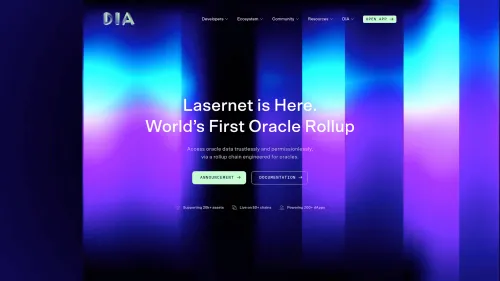DIA (DIA)
DIA is a blockchain oracle platform designed to offer transparent and verifiable price data for assets across various blockchain networks. It supports decentralized finance (DeFi) applications by sourcing first-party data directly from both decentralized and centralized trading venues. This provides a transparent view of data sourcing, computation, and delivery, assisting Web3 projects in adapting to market changes.
Overview
DIA functions as a cross-chain, open-source platform providing data and oracle services for Web3. It is a trustless oracle network that distributes verified data feeds for both traditional and digital financial systems across multiple blockchains. Operated by a permissionless system, DIA involves nodes and stakers in data sourcing, secured through crypto-economic and cryptographic techniques. Its Ethereum Layer-2 rollup, known as "Lasernet," manages key oracle functions, ensuring trustless computation and data verifiability.
Products

| Ticker | DIA |
| Category | Decentralized Finance (DeFi) |
| Website | https://diadata.org/ |
| @DIAdata_org | |
| Telegram | DIAdata_org |
| https://www.reddit.comr/DIAdata | |
| Contract Addresses | |
|---|---|
| ethereum | 0x84...19 Copied! Copied! |
| sora | 0x00...43 Copied! Copied! |
| binance-smart-chain | 0x99...dd Copied! Copied! |
Asset price feed
DIA token price feeds offer real-time data for over 3,000 cryptocurrencies from more than 80 high-volume exchanges, supporting various DeFi applications like lending and derivatives. These feeds are compiled using trade data from multiple transparent sources, ensuring wide asset coverage and customizability. They are processed using customizable methods such as outlier filtering and advanced pricing techniques and are deliverable off-chain and on-chain across over 35 integrated blockchains via APIs or oracles.
NFT floor price
DIA xFloor provides real-time price feeds for over 18,000 NFT collections, integrating into DeFi using direct on-chain trade data from numerous NFT marketplaces. It offers robust, customizable price feeds that are resistant to manipulation, supporting deployment either on-chain or through API according to user specifications.
Randomness
DIA xRandom supplies smart contracts with verifiable and unbiased random numbers via drand’s distributed randomness beacon, updated every 30 seconds. This service supports a wide range of on-chain applications, including gaming, lotteries, and NFT launches, by providing a secure and decentralized randomness oracle across more than 20 Layer-1 and Layer-2 blockchains. DIA’s xNode network ensures the efficient and secure distribution of randomness while preventing result manipulation.
Fair-value feeds
DIA xFair is an oracle product that supplies price feeds for illiquid assets, like Liquid Staking Tokens (LSTs), by evaluating on-chain collateral ratios. This method allows for accurate and transparent pricing, aiding DeFi protocols in risk management and supporting use cases such as lending and money markets. The xLSD feeds assess the collateralization of base tokens and derivatives, offering customizable parameters for various protocols across over 30 blockchains.
RWA price feeds
DIA collects data from diverse financial sources to ensure precise and unbiased pricing for over 20,000 traditional financial assets, including stocks and commodities. These price feeds support the creation of on-chain applications like financial derivatives, stablecoins, and prediction markets.
Oracles
Nexus
Nexus is a flexible oracle solution designed to accommodate the cross-chain requirements of decentralized applications. It directly collects first-party market data from exchanges without relying on third-party data providers, transforming this raw data into reliable price feeds using transparent computational methods. These feeds are delivered through API and pushed on-chain via oracle smart contracts, supporting major Layer-1 and Layer-2 blockchains. Nexus functions through three stages: sourcing granular market data, processing it with transparent methodologies, and delivering the feeds on-chain via a decentralized node network.
DIA Lumina
DIA Lumina is comprised of modular components centered around Lasernet, an Ethereum Layer-2 rollup that performs crucial operations such as data storage, computation, and verification. It employs staking incentives for decentralized data sourcing, zero-knowledge proofs for off-chain data validation, and cross-chain messaging for oracle data delivery. Lumina includes features like Feeders that obtain trade data from exchanges, Pods that store price data on-chain, and Aggregators that produce median values using customizable rules. Lasernet, the core of DIA Lumina, acts as an open, scalable data chain powered by the DIA token, designed for interoperability and decentralized data sharing.
DIA DAO
DIA token holders are involved in the platform's governance through various modules. These include DIA Improvement Proposals (DIPs) for product-related changes, General DIA Proposals (GDPs) for operational or community issues, Community Approval Requests (CARs) for streamlining product category approvals, and Custom Delivery Requests (CDRs), allowing decentralized applications to request customized data feeds.
DIA Token
The DIA Token enables community governance of the platform, allowing members to propose ideas that, if approved, are voted on via Snapshot. The updated tokenomics feature staking incentives, where node operators and delegators earn rewards by securing the network, alongside mechanisms like market-buying DIA to support long-term tokenomics. Moreover, DIA acts as the gas token for the Lasernet rollup, collecting transaction fees to enhance its utility, with a total supply of 200 million tokens.
Partnerships
DIA has formed partnerships with a wide array of platforms, including Acala, Aleph Zero, Alephium, Arbitrum, Astar, Aurora, Avalanche, Base, Bevm, BNB Chain, BOB, Boba Network, Celo, CLV, Conflux, Cross Finance, Ethereum, Evmos, Fantom, Fuse, Gelato, Gnosis Chain, Kadena, Linea, Lukso, Metis, Moonbeam, Moonriver, NEAR, Neon, Nervos, OKC, Optimism, Polkadot, Polygon, Pontem Network, Shiden, Solana, Stacks, Telos, Vara, Velas, Wanchain, and zkSync.
